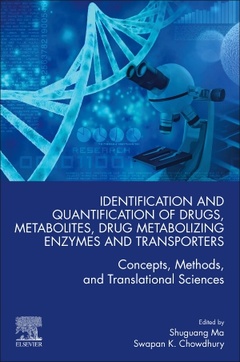Description
Identification and Quantification of Drugs, Metabolites, Drug Metabolizing Enzymes, and Transporters (2nd Ed.)
Concepts, Methods and Translational Sciences
Coordinators: Ma Shuguang, Chowdhury Swapan
Language: English
Subject for Identification and Quantification of Drugs, Metabolites...:
708 p. · 19x23.3 cm · Paperback
Description
/li>Contents
/li>Readership
/li>Biography
/li>Comment
/li>
Identification and Quantification of Drugs, Metabolites, Drug Metabolizing Enzymes, and Transporters, Second Edition, is completely updated to provide an overview of the last decade?s numerous advances in analytical technologies for detection and quantification of drugs, metabolites, and biomarkers. This new edition goes beyond LC-MS and features all-new chapters on how to evaluate drug absorption, distribution, metabolism, and excretion, potential for hepatic and renal toxicity, immunogenicity of biotherapeutics and translational tools for predicting human dosage, safety and efficacy of small molecules and biologics. This book will be an important handbook and desk reference for pharmacologists, toxicologists, clinical scientists, and students interested in the fields of pharmacology, biochemistry, and drug metabolism.
Part I: Techniques for Identifying and Quantifying Drugs and Metabolites 1. Bioanalysis of Small and Large Molecule Drugs, Metabolites, and Biomarkers by LC-MS 2. Recent advances in mass spectrometric and other analytical techniques for the identification of drug metabolites 3. High-resolution mass spectrometry-based data acquisition and data mining technologies for detecting and characterizing drug metabolites and herbal medicine components 4. Metabolite Generation and Metabolite Characterization by NMR 5. Application of SFC for bioanalysis 6. AMS in drug development: Exploring the current utility of AMS and future opportunities for Absolute Bioavailability and ADME investigations
Part II: Drug Metabolism Enzymes, Transporters and Drug-Drug Interaction 7. Using in vitro methods to determine P450s responsible for metabolism and discrimination from other oxidative pathways 8. Evaluation of the clearance mechanism of non-CYP enzymes mediated drug metabolism and DDI as a victim drug 9. In vitro Characterization and In Vitro to In Vivo Predictions of Drug-Drug Interactions 10. Role of Transporters in drug disposition and Drug-drug Interactions 11. Mechanisms and Clinical Relevance of Pharmacokinetic-based Clinical Drug-drug Interactions for Drugs Recently Approved by the U.S. Food and Drug Administration 12. Quantifying drug metabolism enzymes and transporters by LC-MS/MS proteomics 13. Protein Drug-Drug Interactions for Disease Modifying Modalities
Part III: Strategy Related to Drug Metabolism and Safety 14. Metabolites in safety testing (MIST) 15. The Use of Stable Isotopes in Drug Metabolism Studies 16. Assessment of Stereoselectivity in Pharmacology, Toxicology and Drug Metabolism 17. Progress of De-Risking Strategies for Drug-Induced Liver Injury (DILI) In the Last Two Decades 18. Predictive and Translational Models for Renal Drug Safety Evaluation 19. Immunogenicity: An Introduction to Its Role in the Safety and Efficacy of Biotherapeutics
Part IV: Translational Sciences 20. Application of Genetically-Modified Rodent Models in Drug Discovery and Development for Translation of Clinical ADME Properties 21. Advances in CRISPR Technologies Enable Novel in vitro Tools for ADME Studies 22. In vitro-In vivo Extrapolation of Human Hepatic and Renal Clearance 23 The Role of Mathematical Modeling in Translational Science 24. PK/PD Driven Starting and Effective Human Dose Determination for Immuno-Oncology Drugs
Drug metabolism scientists and toxicologists, medicinal chemists, clinical chemists, non-clinical and clinical pharmacologists in the pharmaceutical and biotechnology industries, scientists working in centres of pharmacokinetic studies and quality control labs, biochemists working in metabolomics. Researchers and graduate students in pharmaceutical sciences, pharmacology, translational sciences, biochemistry, drug metabolism and pharmacokinetics
Dr. Chowdhury is currently a Director of DMPK at Takeda Pharmaceutical International Co. in Cambridge, MA, responsible for evaluating metabolism, toxicity, and potential for drug-drug interaction due to modulation of activities of metabolizing enzymes and transporters by compounds in discovery and development. Dr. Chowdhury obtained his Ph.D. from the University of Alberta in 1987. After spending a year and a half as a post-doctoral fellow at the University of Toronto, Dr. Chowdhury joined Rockefeller University as a Research Associate in the laboratory of Professor Brian Chait. At Rockefeller University, Dr. Chowdhury was involved in the early stage of the development of atmospheric pressure ionization (API) mass spectrometry. This early research on API led to the introduction of a novel API system for LC/MS. After leaving Rockefeller University, he worked on the applications of liquid chromatography/mass spectrometry techniques at several non-academic organizations, including at Schering-Plough Research Institute (SPRI), where he worked for fifteen years in the Department of Drug Metabolism and Pharmacokinetics. The focus of his resea
- Four sections in the book with 24 chapters give readers an overview of state-of-the-art techniques for identifying and quantifying drugs, metabolites and biomarkers, including a chapter on new approaches for quantification of enzymes and transporters in different tissues
- Focuses on the role of drug metabolism enzymes, transporters in disposition and drug-drug interactions, as well as strategies for evaluating drug metabolism and safety using advanced liver and kidney models. Discussions on immunogenicity risks of biologics and their evaluation methods have been included
- Includes several chapters on advanced translational sciences to predict human dosage, pharmacokinetics and efficacy for small molecules and biotherapeutics
- All chapters are written by experts with a wide range of practical experience from the industry and academia



